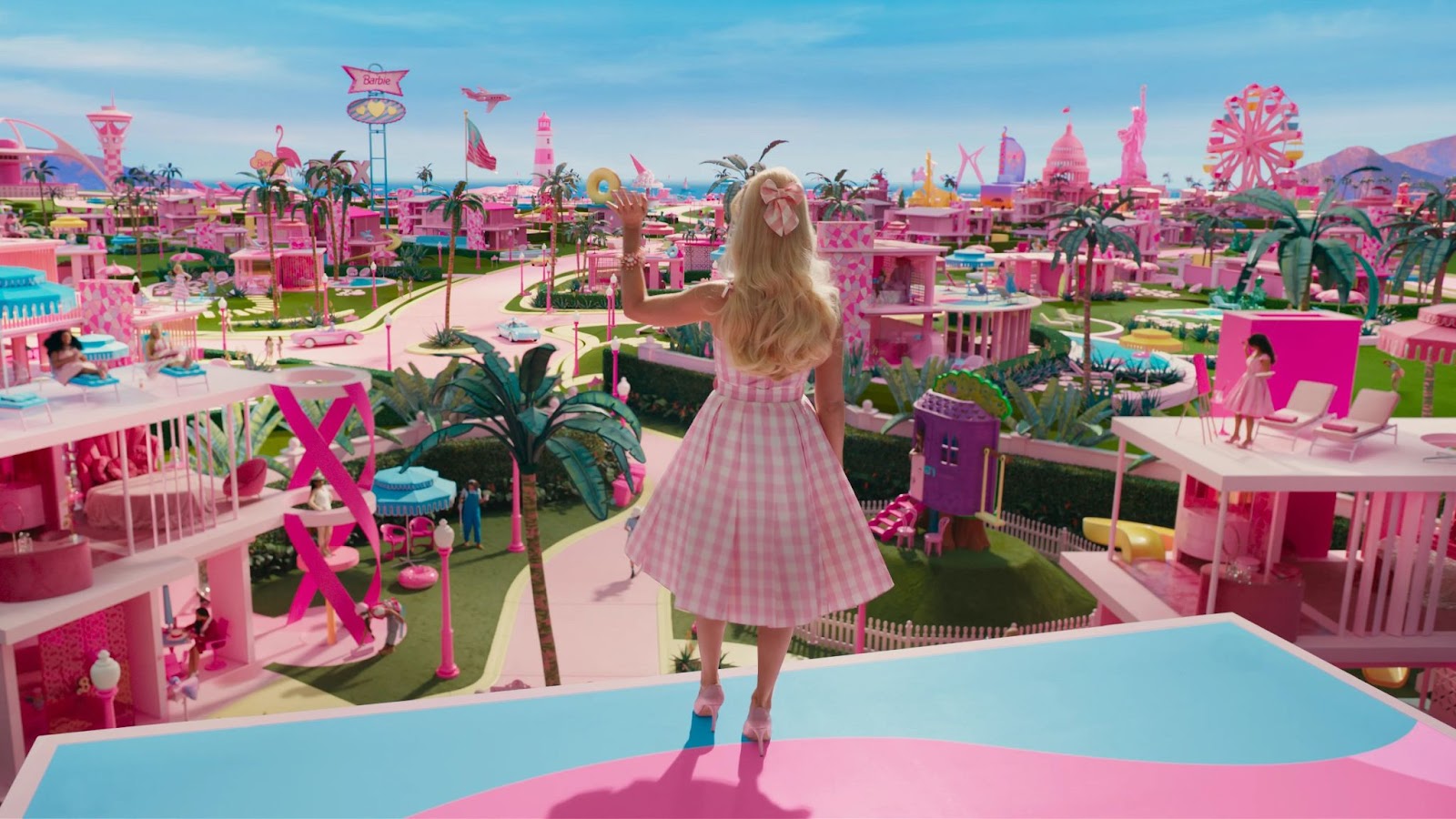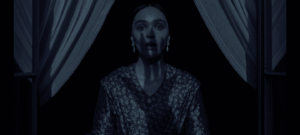Content warning: This article discusses sexual violence.
“Men don’t come in this film … Only women here!” director Olivia Wilde told Variety in an interview about her film Don’t Worry Darling (2022).
Purporting that the movie celebrated “female pleasure,” (at least, for straight women) Wilde seemed proud to be bridging the orgasm gap by omitting on-screen male sexual gratification. But instead of exalting female sexuality, the trailer exploited it for a box office boost by spending a disproportionate amount of time on an inconsequential scene of leading man Jack—portrayed by pop star Harry Styles—performing oral sex on Florence Pugh’s character, his wife Alice. Pugh expressed frustration about her work being “reduced” to a visual of “the most famous man in the world [going] down” on her character, which she believed was inevitable given her performance opposite Styles. After a massive media buildup that foregrounded the leading characters’ relationship, when Don’t Worry Darling finally came out, it was obvious that destigmatizing female pleasure was not its goal: in fact, the sex scenes were nothing but plot points to demonstrate how the men control the women, pleasuring their wives to keep them docile and unaware of the dystopian simulation they’ve been trapped in by their husbands. Considering that the men are manipulating reality, the women are not even truly able to give consent.
Don’t Worry Darling’s weaponization of female sexuality is just one instance of a so-called “feminist” film that has gotten it wrong recently. Another is Blonde (2022), the Netflix biopic about Marilyn Monroe starring Ana de Armas that gratuitously and graphically reenacts the trauma of the late actress’ life; The New York Times aptly titled its review, “Exploiting Marilyn Monroe for Old Times’ Sake.” Trauma porn is touted as a sympathetic way to help us better understand Norma Jeane’s tragic life.
These two titles speak to a larger issue in contemporary cinema in which films that claim to empower women actually flatten the female characters by portraying them as victims. What’s more, the film industry exploits straight women’s sexual desire to sell movie tickets; as Kristen Ghodsee wrote in her book Why Women Have Better Sex Under Socialism, “Capitalism has no problem commodifying sexuality.” On the other hand, the leading ladies who are hyper-vigilant about not being victimized often get boxed into the one-dimensional role of being a negative: a “not victim.” In Magic Mike’s Last Dance (2023) for example, Salma Hayek’s character spews clichés about not needing a man and how women deserve to experience sexual pleasure, too (also known as, the bare minimum). Her personality beyond a ball-busting woman who wants to stick it to all men is essentially nonexistent.
Though the aforementioned films are seemingly aimed at female viewers, I for one don’t want them. In 2023, it should not be impossible to portray women as self-sufficient people who have other motivations for success aside from wanting to spite all men. Of course, ignoring gender inequality would be dishonest, but there are surely ways to portray women exerting agency against patriarchy without defining them by it.
The films that often succeed in empowering women are those that forgo a realistic setting to get at something deeper. Don’t Worry Darling had the potential to do so, but framing female pleasure as a self-destructive weapon in a male-controlled simulation makes the real patriarchy seem utterly paradisiacal by comparison—as a woman who lives in reality, it was disheartening to see that be the desired destination for female liberation. Many of Don’t Worry Darling’s predecessors successfully embraced the thriller or fantasy genres to reimagine a more equitable world for women. Using the horrific, absurd, or supernatural to represent true female agency places it at a considerable distance from reality, perhaps making it more palatable to the male-dominated film industry and to mainstream audiences; but more importantly, it demonstrates that our lives would be completely unrecognizable if female sexuality was as destigmatized as male pleasure, or if women didn’t have to worry about what they’re wearing to get home safe every night. The fantastical allows filmmakers and audiences to envision more creative, progressive storylines for women.
A stellar example is Emerald Fennell’s Promising Young Woman (2020), a thriller that uses horror tropes to communicate the threat that an angry woman poses to male power. Its candy-colored sets and costumes contrast the suspenseful score and disorienting cinematography to create a farcical dream world that’s insidiously nightmarish. Though the film engages misogynistic stereotypes of the seductive sexual temptress and the unhinged, vengeful woman, the fact that the men are never actually in danger subverts the conventional molds to show that labels like “crazy,” “dangerous,” or “angry” get thrown around to undermine women and their challenges to patriarchy. The story follows Cassie Thomas (Carey Mulligan), a woman on the cusp of 30 who dropped out of med school after a male classmate raped her best friend, Nina, which precipitated her suicide. Cassie exacts revenge on the entire male species by going out to bars, pretending to be drunk, letting predatory men take her home with them, and suddenly making her sobriety known right as they’re about to assault her to confront them with their depravity.
Promising Young Woman also addresses the “nice guy” archetype that’s become increasingly popular and has led to phrases like “not all men” gaining momentum. Cassie’s love interest, the supposedly sweet pediatric surgeon Ryan (Bo Burnham), attended school with Cassie and Nina and reenters Cassie’s life after Nina’s death—but his apparent harmlessness is a weapon itself, as it led Ryan to stand idly by while Nina was assaulted, a fact Cassie learns later in the movie. Promising Young Woman isn’t a perfectly progressive film; Cassie’s whiteness and blondeness are framed as tools that allow her to entrap men, perpetuating the narrative that white femininity has an inherent innocence. Still, the film’s central plotline is about a woman exercising agency to combat male control rather than haplessly accepting her circumstances.
Fennell’s film brings to mind the 2009 cult classic horror-comedy Jennifer’s Body, directed by Karyn Kusama and starring Megan Fox as the titular Jennifer Check. In the movie, Jennifer is violently killed by a group of older men who hunt young girls for their ritual “virgin sacrifices,” acts that clearly evoke sexual assault. Unbeknownst to the murderers, Jennifer is “not even a backdoor virgin,” which makes the sacrifice go awry. Jennifer comes back to life as a flesh-eating monster who lures predatory men in with her looks and subsequently kills them. Jennifer’s story is clearly about white femininity as well, and this film includes several racist lines of dialogue and plot points that are supposed to pass for humor. But in terms of its portrayal of female agency, it’s similar to Promising Young Woman in that both use horror tropes to show that men who want to dominate women’s bodies become absolutely terrified and powerless when women bite back.
Although horror-comedies and dystopian films can effectively encapsulate women’s (justified) rage and their responses to it, perhaps the fantasy worlds in which strong female leads thrive don’t have to be monstrous; director Greta Gerwig’s highly anticipated Barbie, set to release in July, will hopefully prove exactly that. Portraying women as dolls may seem like the opposite of giving them agency, and casting Margot Robbie and Ryan Gosling as Barbie and Ken is hardly innovative, but what gives me hope are the promotional movie posters that introduce the cast. Each presents a different “Barbie” and “Ken” with a one-line bio, and while Robbie’s poster reads “Barbie is everything,” Gosling’s simply says, “He’s just Ken.” The rest of the posters similarly spotlight women while poking fun at the men: Emma Mackey’s Barbie “has a Nobel Prize in physics,” Issa Rae’s “is President,” Hari Nef’s “is a doctor”; on the other hand, Simu Liu’s poster says, “He’s another Ken,” Kingsley Ben-Adir is “Ken, too,” and Connor Swindells is “like an intern or something.” As the (in)famous Aqua song says, it’s a Barbie world—the Kens just live in it.
As one of the best-selling toys of all time, Barbies are the medium through which generations of young girls have envisioned their futures. Though the dolls have contributed to exclusionary and unrealistic beauty standards of whiteness and thinness, Gerwig’s Barbie world includes a diverse range of women and careers, diluting the emphasis on physical aspects as Barbies’ defining characteristics. Instead of hoping to one day look like Barbie, young girls can hope to be like Barbie, aspiring toward careers as doctors, physicists, or presidents in this woman-led world. Barbie also appears to satirize the notion that either men or women must be dominant by suggesting that the latter would do a better job; while the male-controlled simulation of Don’t Worry Darling is terrifyingly dystopian, the Barbie world is truly utopian. Although most proponents of female liberation envision an egalitarian society, Gerwig’s Barbie jokingly suggests that if gender equality is truly untenable, women would at least be more benevolent overlords than men.
It may seem bleak to say that real-world movie settings are unconducive to stories about women’s liberation, but these films ultimately expose how unrecognizable a non-patriarchal society would be. Gerwig’s Barbie has the potential to prove that female agency doesn’t have to be scary; but as a real girl fed up with the real world, I’ll continue to indulge deliciously evil revenge plots like Jennifer’s and Cassie’s until I can live Barbie’s fantastic life in plastic.






good one